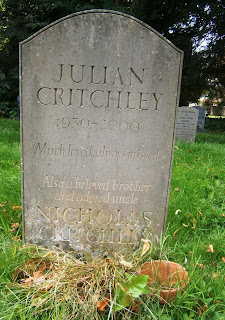Julian Critichley sat for Rochester and Chatham between 1959 and 1964, and for Aldershot between 1970 and 1997. As his Guardian obituary by John Biffen suggested:
The broken Westminster service between 1964 and 1970 was crucial to Critchley's political career. He was a liberal Tory, supporting one-nation social policies, membership of the European Community, and a defence policy based on Nato and a nuclear strategy. He would have been a natural and able young ally for Edward Heath, campaigning for him against the Conservative right, which was increasingly hostile to the Rome Treaty and current levels of public spending. No one can say how Critchley would have handled his opportunities had he remained in Westminster between 1964 and 1970 ...
He was always vulnerable because of his irreverent humour, which could lead to incautious and overt disrespect. If he had been able to reign back this, and with application surely he could, then opposition service during the parliaments of the 1960s could have ensured office in the 1970-74 Heath administration. This was not to be. Soon, he was politically marginalised by the triumph of Margaret Thatcher. He doubted her policies and even more the self-righteous way in which they were promoted.His political ambitions thwarted, Critchley became increasingly popular as a journalist and broadcaster on politics.
Critchley's biography A Bag of Boiled Sweets is one of the most human political memoirs I know and also expresses his love of Shropshire.
He also gave a revealing interview to Naim Attallah:
I had two heroes in politics: Macmillan and Roy Jenkins. Macmillan, because he controlled to a very great extent Britain’s decline in power and was responsible for our adjustment in straitened circumstances – something he managed despite a party of fools. My admiration for Roy Jenkins was based on the fact that as a young Labour MP he would advocate the cause of Europe in cross-party meetings, and he advocated brilliantly.

No comments:
Post a Comment